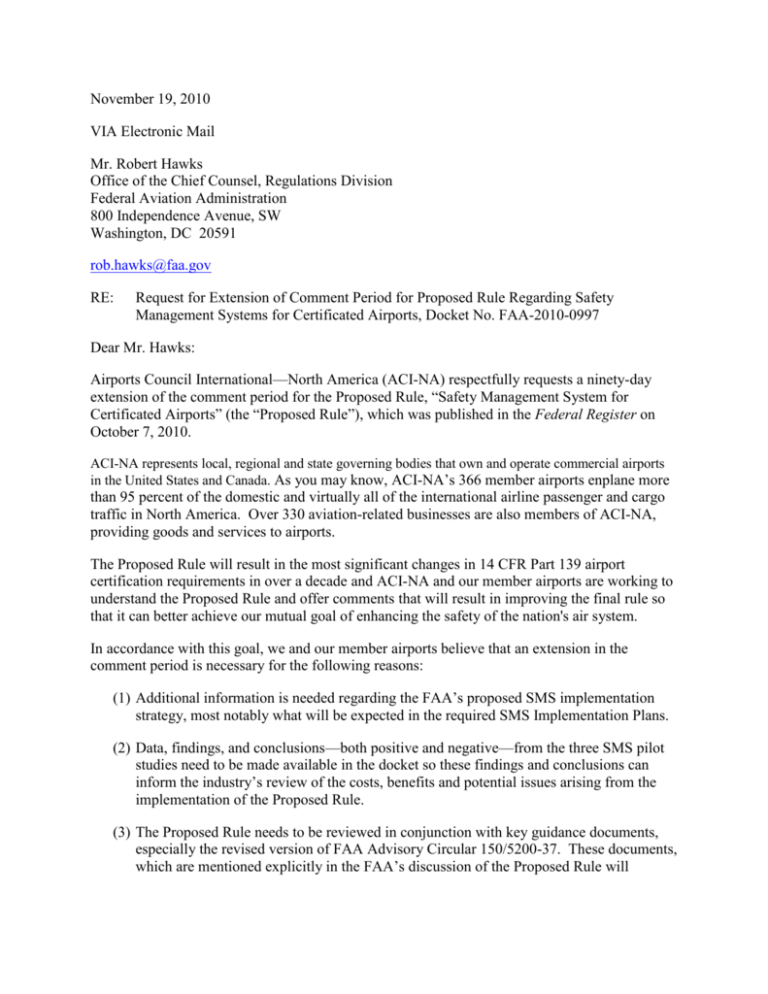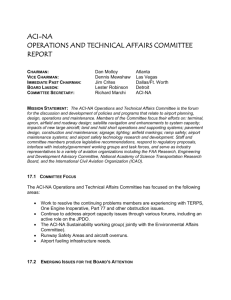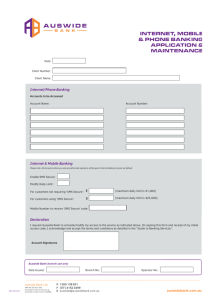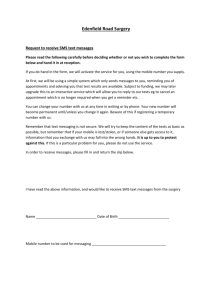November __, 2010 - Airports Council International
advertisement

November 19, 2010 VIA Electronic Mail Mr. Robert Hawks Office of the Chief Counsel, Regulations Division Federal Aviation Administration 800 Independence Avenue, SW Washington, DC 20591 rob.hawks@faa.gov RE: Request for Extension of Comment Period for Proposed Rule Regarding Safety Management Systems for Certificated Airports, Docket No. FAA-2010-0997 Dear Mr. Hawks: Airports Council International—North America (ACI-NA) respectfully requests a ninety-day extension of the comment period for the Proposed Rule, “Safety Management System for Certificated Airports” (the “Proposed Rule”), which was published in the Federal Register on October 7, 2010. ACI-NA represents local, regional and state governing bodies that own and operate commercial airports in the United States and Canada. As you may know, ACI-NA’s 366 member airports enplane more than 95 percent of the domestic and virtually all of the international airline passenger and cargo traffic in North America. Over 330 aviation-related businesses are also members of ACI-NA, providing goods and services to airports. The Proposed Rule will result in the most significant changes in 14 CFR Part 139 airport certification requirements in over a decade and ACI-NA and our member airports are working to understand the Proposed Rule and offer comments that will result in improving the final rule so that it can better achieve our mutual goal of enhancing the safety of the nation's air system. In accordance with this goal, we and our member airports believe that an extension in the comment period is necessary for the following reasons: (1) Additional information is needed regarding the FAA’s proposed SMS implementation strategy, most notably what will be expected in the required SMS Implementation Plans. (2) Data, findings, and conclusions—both positive and negative—from the three SMS pilot studies need to be made available in the docket so these findings and conclusions can inform the industry’s review of the costs, benefits and potential issues arising from the implementation of the Proposed Rule. (3) The Proposed Rule needs to be reviewed in conjunction with key guidance documents, especially the revised version of FAA Advisory Circular 150/5200-37. These documents, which are mentioned explicitly in the FAA’s discussion of the Proposed Rule will 2 describe the standard means of compliance with the Proposed Rule and are needed to understand the scope and scale of airport SMS requirements. (4) Additional time will be needed for technical analyses by commenters, including analyses of the costs and benefits of phased SMS implementation, an implementation approach on which the FAA has specifically requested comments. (5) The comment period—which extends from October 7, 2010, to January 5, 2011—occurs during a time period that is extremely busy for airport operations departments—which have a key role in commenting on the proposed rule. These reasons are discussed in greater detail in the following paragraphs. Rationale for Extension of the Comment Period Reason 1—Need for More Detail Regarding SMS Implementation Plan Requirements. The Proposed Rule provides few details regarding what information should be included in SMS Implementation Plans. Section 139.403 of the Proposed Rule specifies that the Plans must provide (1) a proposal on how the certificate holder will meet the requirements of the Proposed Rule and (2) a schedule for implementing the SMS components prescribed in the Proposed Rule.1 The discussion of the implementation plan requirements that precede the proposed rule under the heading “Proposed Implementation Plan Requirements:” does not elaborate on these requirements. To facilitate meaningful public comment on the Implementation Plan requirements, ACI-NA respectfully requests that the FAA provide additional information regarding the expected contents of required Implementation Plans well in advance of the close of the comment period. Reason 2—Documentation Regarding All Three SMS Pilot Studies Needs to Be Made Available in the Docket. In its discussion of the Proposed Rule, the FAA frequently references findings and conclusions from its three airport SMS pilot studies. Findings from the pilot studies appear to have been used to establish SMS implementation deadlines and costs. These findings also appear to have played key roles in FAA’s decisions to (1) reject a phased-in approach to SMS implementation, (2) include non-movement areas of the airfield within the purview of the Proposed Rule, and (3) establish processes for safety risk assessment and mitigation. We are pleased that the FAA has used data collected from these “real-world” pilot studies and support the use of lessons learned from the field in the FAA’s rulemaking efforts. However, we strongly believe that such data and “lessons learned” must be made available to commenters to inform their comments. p. 62023. “Safety Management System for Certificated Airports”, Notice of Proposed Rulemaking, 75 Fed. Reg. 62008-62023, October 7, 2010. 1 3 In terms of pilot study documentation, we are aware of only one high level PowerPoint presentation2, which deals with only the first of the three SMS pilot studies. This presentation seems to contradict several assertions made in the Proposed Rule. For example, the presentation notes that phased implementation of SMS “seemed universally accepted” and that program implementation would require “years not months”. The presentation also notes that “scant data” were available regarding SMS implementation costs and schedules. Since issuance of the October 2008 presentation, we expect that the FAA has collected additional data from participants in all three SMS pilot studies to support findings presented in the Proposed Rule including (1) the FAA’s rejection a phased approach to SMS implementation and (2) implementation schedules that take place over a period of months rather than years. However, as far as we are aware, these data have not been made available to commenters. Similarly, the only data that we have seen addressing SMS program costs and benefits appear in the document Initial Regulatory Evaluation, Safety Management System for Certificated Airports, dated December 22, 2009.3 Because of this document’s release date—which is prior to the commencement of the third SMS pilot study—we believe that the data it contains are incomplete and not necessarily indicative of the costs that all pilot study airports have incurred. (We also note that this key document has only been publicly available since it was posted to the docket of the Proposed Rule on October 13, 2010, almost a year after its publication.) We respectfully request that the FAA provide current, comprehensive reports regarding the data collected and findings from the three SMS pilot studies well in advance of closure of the Proposed Rule’s comment period so that commenters can (1) understand why the FAA’s initial positions as reported in October 2008 have changed and (2) have necessary data to perform benefit-cost analyses of phased implementation strategies as requested by the FAA (see “Reason 4” below). Reason 3—Proposed Advisory Guidance Regarding Airport SMS Needs to be Available Prior to Closure of the Comment Period. In its discussion of the Proposed Rule, the FAA states “the FAA intends to publish any accompanying Advisory Circulars prior to the final rule….” A similar commitment appears on the FAA Office of Airports’ website4, which notes “if a regulation on SMS is adopted, FAA will update the SMS Advisory Circular (AC 150/520017) [and] issue additional guidance as necessary for its implementation, including a detailed checklist and possibly a model SMS plan document.” We believe that this advisory guidance— which will detail what will be expected from airports under a final SMS rule—is essential to understanding the effects and consequences that SMS will have on the nation’s airports. 2 SMS for Airports—Findings of the First Pilot Study, FAA Office of Airports, October 30, 2008. <http://www.faa.gov/airports/airport_safety/safety_management_systems/external/pilot_studies/ media/1st_sms_pilot_present.pdf> 3 Initial Regulatory Evaluation, Safety Management System for Certificated Airports, FAA Office of Aviation Policy and Plans, December 22, 2009. 4 http://www.faa.gov/airports/airport_safety/safety_management_systems/external/guidance/ 4 Accordingly, we believe that such guidance—even if in draft form—must be made available for public review prior to closure of the Proposed Rule’s comment period. In particular, we request that revised draft AC 150/5200-17, a model SMS manual, and a model SMS implementation plan be made available via the docket for the proposed rule well in advance of the close of the Proposed Rule’s comment period. Reason 4—Additional Time is Needed for Technical Analysis by Commenters. In its discussion of the Proposed Rule, the FAA notes, “If you believe the FAA should adopt a phasedin approach for the SMS components, please provide specific recommendations for how the requirements could be phased in and analysis of the effect on implementation costs and the corresponding postponement of the safety benefits.”5 ACI-NA has not yet taken a position regarding a phased-in approach to SMS at U.S. airports. However, through conversations with representatives from U.S. airports that participated in the FAA’s SMS pilot studies and Canadian airports that are in the process of implementing SMS, we understand there may be great value in a phased-in implementation approach. Accordingly, we do expect that an independent analysis of the benefits and costs of a phased-in approach will be needed. Such analysis will require both time and data regarding the U.S. SMS pilot studies that have not yet been released by FAA. Reason 5—Current Comment Period Coincides with Extremely Busy Periods for Airport Operations and Safety Professionals. The comment period—which extends from October 7, 2010, to January 5, 2011—occurs during a time period that is extremely busy for airport operations departments—which have a key role in commenting on the proposed rule. This period encompasses the very busy Thanksgiving and December holiday travel periods, as well as months when snow clearance operations are highly likely. We are very concerned that airports—including those that participated in the SMS pilot studies—will find their ability to provide meaningful comments regarding the Proposed Rule limited by these operational circumstances. We urge the FAA to reconsider its decision to schedule the comment period of this extremely important and consequential rule during this busy season. Conclusion A ninety-day extension of the comment period will bring the comment period to a close at the beginning of April, which should provide the FAA with sufficient time to provide needed guidance regarding SMS implementation plan contents, lessons learned from the three stages of the SMS pilot studies and revised SMS advisory guidance. It also carries the deadline beyond both the peak holiday travel season and winter snow seasons. With the additional time, key members of our industry will be better positioned to fully consider and articulate comments on the Proposed Rule. Not only will the additional time reduce the burden on the airport operations and safety professionals in our industry, but access to unhindered industry expertise will benefit the FAA by providing for a better-informed process and a more supportable final rule. p. 62017. “Safety Management System for Certificated Airports”, Notice of Proposed Rulemaking, 75 Fed. Reg. 62008-62023, October 7, 2010. 5 5 * * * * * * ACI-NA appreciates the opportunity to comment on the Proposed Rule and—in collaboration with our members—looks forward to providing the FAA with meaningful comments that critique and enhance the Proposed Rule. To facilitate needed industry participation in the rulemaking process, we respectfully request that FAA grant the ninety-day extension of the comment period. Thank you for your time and consideration of this request. cc: Ms. Catherine M. Lang, Acting Associate Administrator for Airports, FAA (catherine.m.lang@faa.gov) Mr. Michael O’Donnell, Manager, FAA Office of Airports Safety & Standards (michael.o’donnell@faa.gov) Ms. Keri Spencer, FAA Office of Airports Safety & Standards (keri.spencer@faa.gov)




